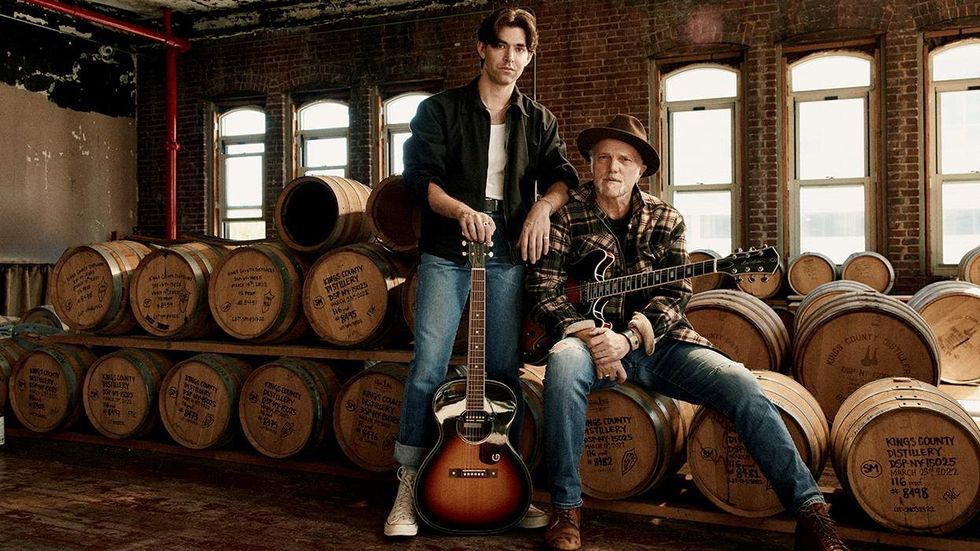
WWW.OUT.COM
'Beau the Musical' brings 'queer joy' and country pop back to off-Broadway
'Beau the Musical' is coming back to off-Broadway.Beau the Musical had a long road to the stage after its short-lived world premiere run at 154 Christopher Street (formerly known as the New Ohio Theatre) in early August. The producers announced that the show will be returning for an encore off-Broadway run, transferring uptown to St. Lukes Theatre.The show is centered around a man named Ace Baker (played by Matt Rodin), a young queer man who forms a connection with his grandfather (Jeb Brown), whom he believed was deceased. "Family secrets unravel as Ace rushes to make up for lost time with a man who changes his world by putting a guitar in his hand. With a rollicking original pop-country score, Beau celebrates the music we leave for the ones we love," the show's official log line reads.Beau The Musical will begin performances on October 13, with an opening night set for October 27. Before the show makes its comeback, Out chatted with the two lead actors to discuss the impact they hope this story about queerness, family, and acceptance will have.Out: What drew you to the project? What are you most excited for audiences to see?Jeb Brown: I've been involved with Beau since 2017. Doug Lyons and I met in the original company of Beautiful (the Carole King musical) and I was aware that he was often writing backstage. When he asked me to read an early draft of Beau I was eager to jump in but I didn't expect to be blown away by this totally original story. At the time there were only three or four songs written but the music was already deeply winning...a sharp blend of funk/roots/blues. But I think it was Doug's characters that really melted me. He writes with a warm, idiosyncratic pen and the results are delicious and true. I'm eager for audiences to see these characters and situations up close in an intimate setting, where the action happens all around our space. It's a roadhouse, a honky tonk, a Nashville music club...it's a good time.Matt Rodin: When I read the very first version of the script, it felt alive in a way I hadnt seen in a musical before. The grooves of the music felt raw, and the people inside the story felt real. Now, years later, its even more lived-in. Off-Broadway gives us the freedom to leave the dirt under the fingernailsand that grit feels closer to the truth of being human, and being queer. People have said it reminds them of the first time they experienced Hedwig, Rent, and Hadestown. To be mentioned in that lineage of rock musicals told in unconventional ways is, in the words of Hilary Duff, what dreams are made of.Given that this show is about a queer man, how does his identity play into the storyline, and why is it essential to tell queer stories in this moment?Brown: Beau is a memory play with music. It's a queer coming-of-age story set in the heart of America. And given that the atmosphere in our culture at this moment features many loud voices challenging and aiming to marginalize queer culture, it seems most important that a story like this [be] told. This is a moment when art about queer lives can have a particularly meaningful impact, offering a reminder that these stories are the stories of our time and a reassurance that audiences and artists alike are still powerfully drawn to and moved by them.Rodin: Beau doesnt treat queerness as an obstacle to overcome or a punchline to land. Its the lens that shapes how Ace experiences lovefor music, for his family, and ultimately for himself. And right now, when there are people and systems working overtime to erase queer lives, stories like this feel less like entertainment and more like necessity. Which is why Im thrilled to be in the middle of this glorious lineup of gay shows in New York and across the country: Oh, Mary!, Mamma Mia, Some Like It Hot, Ginger Twinsies, Saturday Church, Prince F, Heathers, Death Becomes Her, Six. Not all of them talk about queerness directly, but in their own way they all say the same thing: were here, were queer, and look how much fun were having. Its queer joy. We need more of thatWhat do you think has been the most impactful about making this show?Brown: Making this show has been its own unique trip. Over a number of years we did many workshops for audiences at Lincoln Center and Joe's Pub and the like, and then just prior to the pandemic we took it up to the Adirondack Theatre Festival for its first full production. 2020 slowed us for a moment, but we had already made a gorgeous record of the songs with Sony Masterworks, featuring some of our folks and also some guest vocalists. One thing led to another and in 2021 we then made a full-length feature film which played festivals to great acclaim and awaits a wider release. This past summer, [the show played] downtown and [was] extremely well received. So what we're presenting now combines elements of all those iterations, with all kinds of interesting wrinkles that our team has gathered and compiled along the way, now mixing together to make this a very seasoned and singular production.Rodin: I think the impact shows up in two places. For audiences, its the conversations after the show. People tell me about their own families, their own experience of queerness, the way the music cracked something open. And theyre often surprised by how much they love the concert framingit feels less like a musical and more like seeing an indie artist in a small venue before they blow up. For me, Beau has been a kind of permission slip. Every collaborator at every step of the process has encouraged me to embrace my own sound, not to fit into a box. That freedom has been rare and radical. And finding that sound has been its own adventure. Which, if Im being honest, lands somewhere between Boz Scaggs, Jason Mraz, and a church ladyMatt, what's kept you with the show for the past seven years, and through that time, what do you feel has changed about the show for the best?Rodin: Seven years is a long time to stay with anythingrelationships, leases, skincare routines. But whats kept me with Beau is that Ace and I have grown up together. I know him as part of myself. Living in him, loving him, sharing him with more and more people has been an incredible privilege. The biggest change for me has been the shift in focus. In the early days, we were vying for attention, trying to prove something. Now its about inviting people in, giving them an experience, and trusting that sharing this story and this music is enough. Its subtle, but its profound. These days, it feels less like were lip-syncing for our life, and more like Sunday drag brunchjust a good time, with friends, doing what we loveJeb, you went to Broadway forDead Outlawfor the first time since 2014 after severaloff-Broadway projects, and now you're returning tooff-Broadway. What do you think is the biggest lesson you've learned during the run ofDead Outlawthat you'll take with you to this new production?Brown: Dead Outlaw was a very special show for everyone involved and it was great to land it on Broadway, but we created it originally for the Minetta Lane production downtown. It was wonderful to be at the Longacre [Theatre] but I find, at the end of the day, that the charge one experiences when an original piece of theatre succeeds is powerful no matter where it happens. As long as there are engaged audiences on hand willing to come along for the ride, good theatre pulses with life wherever it is presented. I've enjoyed countless unforgettable moments sitting in Broadway theaters, but I've experienced just as many in the off-Broadway houses around this city...and oftentimes off-Broadway means more affordable tickets, more daring work, and more intimate settings.Previews of Beau the Musical begin October 13 at St. Luke's Theatre in NYC. Learn more at beauthemusical.com.
0 Comments
0 Shares
78 Views
0 Reviews



